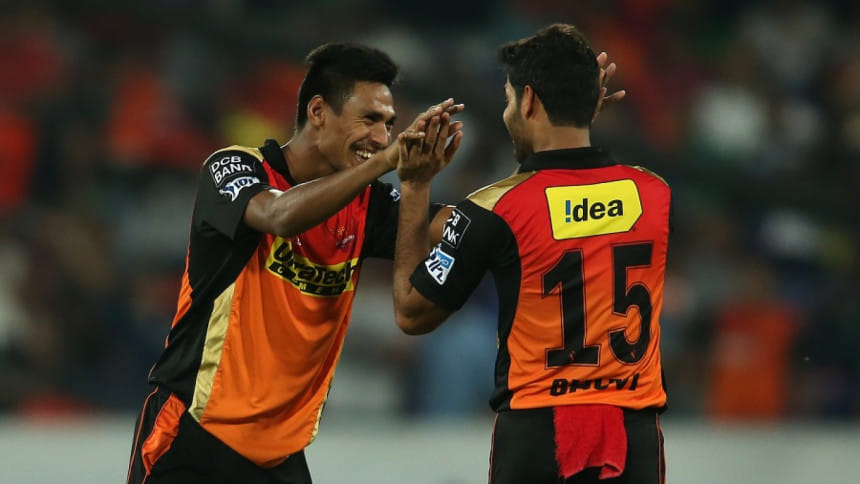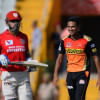Mustafizur at home in an unfamiliar land

"Mustafizur Rahman is afraid of only two things - batting and speaking English."
Mustafizur arrived in the IPL with the reputation of being a wonder kid and has lived up to it with 16 wickets from 14 matches for Sunrisers Hyderabad, at an economy rate of 6.71. This isn't the first time he has done well in India - he took nine wickets in only three games during the World T20 - but it is important to appreciate the constraints he has had to overcome to work his magic in the IPL.
Despite a rousing start to his international career, the IPL, it is fair to say, has been a unique challenge for Mustafizur. For starters, it is the longest he has spent outside his natural environment without a fellow Bangladeshi for company. It doesn't help that he is prone to homesickness. While such things come with being a professional sportsperson, the biggest handicap for Mustafizur has been his inability to speak English.
Sunrisers batsman Ricky Bhui, who was part of India's Under-19 World Cup team in 2014 and 2016, is the only player in the squad that speaks Bengali, Mustafizur's mother tongue. Bhui knows 'The Fizz' from 2014, when they were part of their respective sides at the Under-19 World Cup in 2014. When Sunrisers' manager knew of Bhui's background he immediately informed coach Tom Moody and captain David Warner, who had even joked on Twitter that he was "using translation on google for fizz. Working out how to speak Bangla hehe. Tora tora." In Bhui, Warner and Sunrisers had found a much-needed translator.
"Mera aur Mustafizur ka achchha banta tha [Mustafizur and I get along very well]," Bhui tells ESPNcricinfo. "Because he couldn't speak English he couldn't have many conversations with others in the team. He would talk to me and so there is good bonding between us."
Soon after Mustafizur had joined the team Bhui briefed him about the role the management required him to play. Bhui says there is very little said at pre-game team meetings, and that most of the communication takes place during strategic time-outs.
"The role he would be required to play in the first 10 overs or the latter half, what he had to bowl to each batsman and which field he had to bowl to needed to be explained to him," Bhui says. "During the strategic time-out I would go and translate Warner's instructions and the field set for him."
Bhui says Mustafizur mostly communicates using "sign language" on the field. "Slower one daalna hai toh aise haath ghumate hain, bouncer hai to sar pe ishaara karte hain [if he's going to bowl a slower one, he rotates his wrist, and if it's a bouncer he points to the head]," he says. "He says only two words - problem and no problem. Not just on the ground but everywhere - be it a press conference or sponsor event or when he speaks to the manager. If he says 'problem' he is totally clueless, if he says 'no problem' then he knows what to do."
Mustafizur, though, hasn't let English come in the way of being himself in matches or at training. In Hyderabad, ahead of Sunrisers' game against Gujarat Lions, Mustafizur rapped Moises Henriques on the ribs. As Henriques wondered how he missed the ball and avoided eye-contact with the bowler, Mustafizur mockingly sashayed towards the batsman with a mischievous grin on his face.
"As a person he is a good character around the team," Moody says. "He is quite a funny guy, you can see that he has got a bright personality. And, you know, he has added value to the side not only on the field but also off the field."
Moody says the communication barrier broke gradually over the course of the tournament. "Not that our Bengali has got any better but his English has probably got a little bit better. Also cricket is a pretty universal language."
Shikhar Dhawan vouches for how Mustafizur's sharp cricketing brain helped him bridge communication gaps. "Most of the times he understands what we tell him," he says. "Mustafiz is a great bowler and has a good sense of cricket, and he understands what we tell him."
Off the field, Mustafizur has kept to himself and stays indoors most of the time. "He always stays in his room," Bhui says. "He has stopped going out for social events because of the fear of speaking [in English]."
According to Bhui, Mustafizur doesn't talk much about cricket and most of his conversations revolve around his family. "There are a few things he says about his bowling, but given that these are team strategies I can't really tell you about them. He always talks about his background and his family. He keeps talking to his brothers on Skype a lot."
Some things, though, haven't changed. "Mujhe batting kabhi nahi karna aur English nahin bolna hai. Hamesha wohi bolta hai [He always keeps saying he doesn't want to bat or speak English]," Bhui says with a laugh. "[But he has still] managed to pick up a few English words."

 For all latest news, follow The Daily Star's Google News channel.
For all latest news, follow The Daily Star's Google News channel. 







Comments